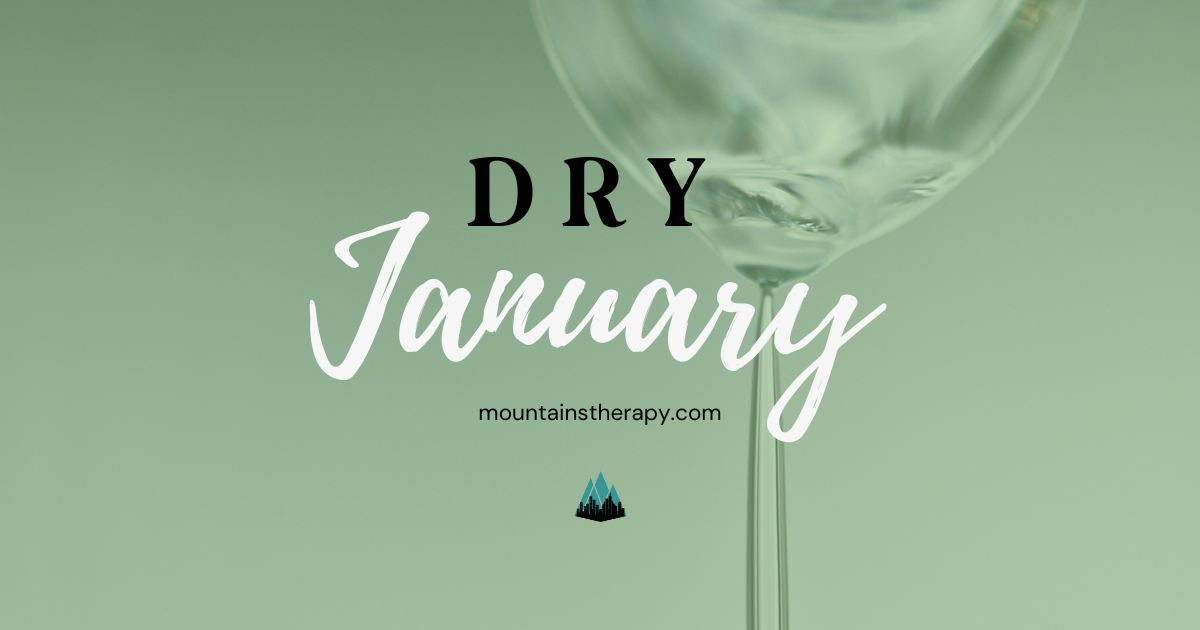Dry January: Therapist Tips from Mountains Therapy in NJ
Learn more about Individual Therapy, Alcohol Use Assessments, and Addiction Counseling here.
As we welcome a new year, many people take on the challenge of Dry January. What is Dry January? It's a month-long commitment to abstain and not drink alcohol. It’s more than just a detox, it’s an opportunity to reset, reflect, and embrace self-care.
At Mountains Therapy in NJ,
we know how powerful even small changes can be when it comes to improving your well-being. If you’re considering Dry January or exploring your relationship with alcohol, an alcohol use therapist can provide guidance and support tailored to your goals.
Start with Your Why
Before diving into
Dry January, take a moment to clarify why you’re doing it. Are you looking to reset your relationship with alcohol, improve your physical health, or simply see how it feels to take a break? Setting clear intentions helps give direction to your journey. Our
alcohol use counseling services are designed to help you set achievable goals and make progress at your own pace.
Example Goals You Might Set:
- Take a full break from alcohol for the month.
- Cut back by designating specific alcohol-free days each week.
- Try mindful drinking, like alternating between alcoholic beverages and water.
Break It Down into Small Steps
We get it, committing to a month without alcohol can feel like a lot. But it doesn’t have to be all or nothing! Breaking your goal into smaller, achievable steps makes the process less overwhelming and more sustainable. Working with an alcohol use counselor can help you navigate these changes and create strategies that work for your lifestyle.
Ideas to Make It Work:
- Try alcohol-free alternatives a few days a week.
- Plan non-alcoholic social activities like going for a walk, hosting a game night, or tackling a fun DIY project.
- Reflect on how these changes make you feel physically and emotionally.
Stay Hydrated
One thing we see often is how important
hydration is when making changes to your habits. Drinking more water not only helps you feel better but can also reduce the effects of
withdrawal symptoms some people experience when they take a break from alcohol.
Simple Hydration Tips:
- Carry a water bottle with you to make drinking water easier.
- Add fruit or herbs to your water for a bit of flavor.
- Set reminders to sip throughout the day—you’d be surprised how often we forget!
Lean on a Support System
Doing
Dry January on your own can feel tough, so don’t be afraid to share your goals with friends, family, or even an online community. Having a
sober support system makes all the difference—whether it’s someone cheering you on or joining you in the challenge. If you need additional support, our
alcohol use therapy services can provide encouragement and help you stay on track.
How to Build Support:
- Invite a friend to join you in Dry January.
- Plan alcohol-free outings together, like coffee dates or hikes.
- Join online groups or forums for encouragement and shared tips.
Mindfulness Can Help
Taking a break from alcohol can stir up unexpected feelings or stress. That’s where mindfulness comes in. By focusing on the present moment, you can stay grounded and connected to your intentions. Whether it’s through meditation, deep breathing, or just taking a mindful walk, these practices can make a big impact. If you’re finding it hard to manage stress, an alcohol use mental health therapist can help you explore mindfulness techniques and other coping tools. We offer Mindfulness-based Therapy (MBT) and can teach you new tools in counseling.
Mindfulness Practices to Try:
- Start your day with a few minutes of quiet reflection or meditation.
- Take a deep breath before meals or during stressful moments.
- Focus on how your body feels as you walk—notice the rhythm of your steps or the air on your skin.
Explore Alternatives to Alcohol
Just because you’re skipping alcohol doesn’t mean you can’t enjoy something delicious. Experiment with alcohol-free beverages to keep socializing fun and flavorful. From mocktails to herbal teas, there’s something for everyone.
Our Favorite Alternatives:
- Try a cozy herbal tea before bed.
- Mix up a mocktail using fresh fruit and sparkling water.
- Check out the growing variety of alcohol-free beers and wines.
Recognize When It's More Than a Challenge
For some people, Dry January can bring up deeper realizations about their relationship with alcohol. If you notice things like cravings, tolerance, withdrawal symptoms, or neglecting responsibilities due to alcohol use, it might be time to explore professional support. At Mountains Therapy, we offer alcohol use mental health counseling to help you understand these patterns and create a plan for healthier habits.
Therapy Can Support Lasting Change
If you’re thinking about extending your journey beyond Dry January, therapy can be a valuable tool. Whether it’s through Cognitive Behavioral Therapy (CBT) or more holistic approaches like mindfulness and yoga, therapy provides a space to explore your habits, manage stress, and build healthier coping strategies. Our alcohol-use mental health therapy services are designed to support your recovery journey and empower you to make lasting changes.
We’re Here to Support You
At Mountains Therapy in NJ, we know that taking a break from alcohol is a personal journey. Whether you’re just trying Dry January for the first time or thinking about long-term changes, we’re here to help you every step of the way. From addressing addiction symptoms to building better habits, we believe in small, sustainable steps that lead to lasting transformation. Ready to explore more? Contact us today, we’d love to be part of your journey to wellness.














